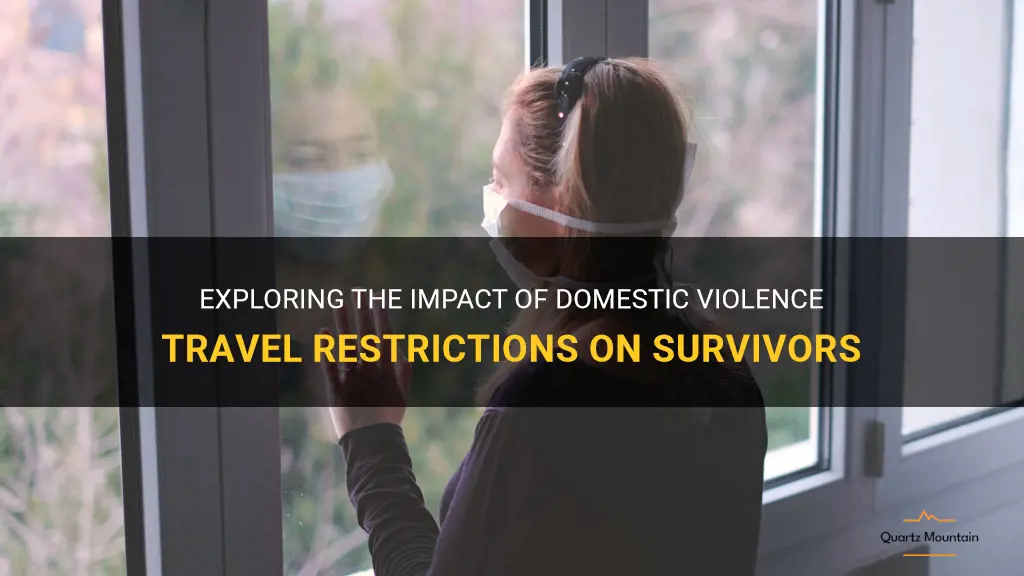
Domestic violence is an alarming and widespread issue that affects millions of individuals worldwide. Unfortunately, the COVID-19 pandemic has only exacerbated this problem, with reports indicating a significant increase in cases during periods of lockdown and travel restrictions. While these restrictions were put in place to protect public health, they unintentionally created an environment where victims of domestic violence were trapped with their abusers, isolated from support networks, and unable to seek help or escape. In this article, we will delve into the devastating impact of travel restrictions on domestic violence victims and explore potential solutions to prioritize their safety and well-being.
What You'll Learn
- What are the current domestic violence travel restrictions in place?
- How do these travel restrictions affect victims of domestic violence?
- Are there any exceptions or exemptions to the travel restrictions for domestic violence victims?
- What support services are available for domestic violence victims who are unable to travel due to the restrictions?
- Are there any efforts or initiatives underway to address the impact of these travel restrictions on domestic violence victims?

What are the current domestic violence travel restrictions in place?

In response to the COVID-19 pandemic, many countries have implemented travel restrictions and lockdown measures. These restrictions have not only impacted the tourism and hospitality industry but have also had unintended consequences on victims of domestic violence. Domestic violence cases have been on the rise during the pandemic, and the restrictions put in place have made it even more challenging for victims to seek help and escape abusive situations.
One of the most significant travel restrictions in place is the suspension of international flights or strict requirements for travelers entering a country. Many countries have closed their borders to foreign nationals or require mandatory quarantine upon arrival. While these measures are crucial for controlling the spread of the virus, they can also trap victims of domestic violence in abusive situations. Victims may be unable to leave the country to seek refuge or escape their abuser due to these travel restrictions.
In addition to international travel restrictions, domestic travel within a country has also been affected. Many regions or cities have implemented lockdowns or stay-at-home orders, limiting movement within the country. While these measures are necessary to prevent the spread of the virus, they can also make it more challenging for victims of domestic violence to escape their abusers. Victims may be confined to their homes, unable to access support services or shelters.
The restrictions on travel have also impacted the support services available to victims of domestic violence. Many organizations and shelters have had to reduce or adapt their services to comply with social distancing guidelines. This may mean reduced capacity in shelters or limited options for victims to seek help. Some organizations have shifted to remote support, providing counseling or assistance through hotlines or online platforms. However, this may not be sufficient for victims who need immediate physical protection or a safe space away from their abuser.
It is important to note that while travel restrictions and lockdown measures may pose additional challenges for victims of domestic violence, they are not the cause of the violence itself. Domestic violence is a social issue that existed long before the pandemic, and it requires a comprehensive response that goes beyond travel restrictions. Governments and organizations need to ensure that support services are available and accessible to victims, even during times of crisis.
In conclusion, the current travel restrictions and lockdown measures in place due to the COVID-19 pandemic have had unintended consequences on victims of domestic violence. These restrictions may make it more challenging for victims to seek help, access support services, or escape abusive situations. It is crucial for governments and organizations to recognize and address these challenges to ensure the safety and well-being of domestic violence victims during these difficult times.
Cracking the Code: Understanding Air Travel Packing Restrictions
You may want to see also

How do these travel restrictions affect victims of domestic violence?

The COVID-19 pandemic has brought travel restrictions that are impacting individuals from all walks of life. One group that is particularly affected by these restrictions are victims of domestic violence.
Domestic violence refers to the abuse or violence that occurs within a family or intimate relationship. It can take various forms, including physical, emotional, and sexual abuse. Victims often rely on support networks and resources outside of their immediate environment to escape their abusive situations. However, travel restrictions make it difficult for them to access the help they need.
One way that travel restrictions affect victims of domestic violence is by limiting their ability to leave their abusive partners. In many cases, victims may need to relocate to a different city or state to escape the abuse. Travel restrictions, such as lockdown measures and closed borders, prevent victims from being able to do so. This effectively traps them in dangerous and abusive situations, further exacerbating their suffering.
Another way that travel restrictions impact victims of domestic violence is by limiting their access to support services. Many victims rely on shelters, counseling centers, and other support organizations to provide them with safety, counseling, and legal assistance. With travel restrictions in place, these resources may be inaccessible or operating at a limited capacity. This poses a significant challenge for victims who are seeking help and safety.
Furthermore, travel restrictions can also impede the ability of victims to reach out to friends and family for support. Oftentimes, victims turn to their close ones for emotional support and assistance in leaving their abusive relationships. However, with the limitations on travel, victims may be unable to physically meet with their loved ones, making it difficult for them to seek the help and support they need.
Additionally, the pandemic has caused significant economic hardships for many individuals, including victims of domestic violence. Job losses and financial instability make it even more difficult for victims to navigate their way out of abusive situations. Travel restrictions further exacerbate these challenges, making it harder for victims to seek financial help or find employment opportunities in other areas.
In response to these challenges, it is crucial for governments and community organizations to adapt their support services to accommodate the needs of victims of domestic violence during travel restrictions. This may include providing remote counseling services, increasing funding for shelters, and establishing safe ways for victims to access resources without violating travel restrictions.
In conclusion, travel restrictions imposed during the COVID-19 pandemic have had a detrimental impact on victims of domestic violence. These restrictions limit their ability to leave abusive partners, access support services, and seek help from friends and family. To address these challenges, it is essential for governments and organizations to adapt their services to provide the necessary support and resources for victims of domestic violence during these difficult times.
The Impact of Canada's Travel Restrictions: Insights from Reddit Users
You may want to see also

Are there any exceptions or exemptions to the travel restrictions for domestic violence victims?

There are some exceptions and exemptions to the travel restrictions for domestic violence victims. Domestic violence is a serious issue that affects countless individuals across the world. These victims often find themselves in dangerous situations and may need to leave their homes or even their country for their own safety. However, travel restrictions can make it difficult for them to escape their abusers and seek help.
In many countries, there are laws and systems in place to protect victims of domestic violence and allow them to travel freely despite any restrictions that may be in place. These laws recognize that domestic violence is a unique and urgent situation that requires immediate attention and intervention.
One common exception to travel restrictions for domestic violence victims is the issuance of a protection order or restraining order. These legal documents are often obtained from a court and can restrict the abuser from contacting or approaching the victim. In some cases, these orders may also include provisions that allow the victim to travel freely, even if there are other travel restrictions in place.
Another exemption to travel restrictions for domestic violence victims may come in the form of special visas or immigration protections. Many countries have specific immigration policies that grant temporary visas or humanitarian protections to victims of domestic violence. These visas typically allow the victim to remain in the country legally, despite any travel restrictions that may be in place. They are often granted on the grounds of the victim's need for safety and protection.
It is important to note that the specific exceptions and exemptions for domestic violence victims can vary greatly from country to country. The laws and policies surrounding domestic violence and travel restrictions will differ depending on the jurisdiction. It is crucial for individuals experiencing domestic violence to seek the advice of a legal professional or a domestic violence support organization in their specific country to understand their rights and available options.
Overall, while travel restrictions can pose challenges for domestic violence victims, there are often exceptions and exemptions in place to ensure their safety and well-being. Through legal protections such as protection orders or special visas, domestic violence victims are able to escape their abusers and travel freely to seek safety and support. It is crucial for victims to educate themselves about their rights and available resources to navigate these challenging situations successfully.
Understanding the Travel Restrictions from Denmark to Spain: What You Need to Know
You may want to see also

What support services are available for domestic violence victims who are unable to travel due to the restrictions?

During the COVID-19 pandemic, one of the unfortunate consequences has been an increase in domestic violence cases. With restrictions on travel and movement in place, it has become even more challenging for victims of domestic violence to access support services.
However, there are still several support services available for domestic violence victims who are unable to travel due to restrictions. These services ensure that victims can seek help and support even from the safety of their homes. Here are some of the support services that victims can utilize:
- Hotlines: Domestic violence hotlines continue to operate round the clock, providing a lifeline for victims in need of immediate assistance. These hotlines are staffed with trained professionals who can offer guidance, support, and resources to victims. Victims can call these hotlines to discuss their situation, seek advice, and receive information about available support services.
- Online counseling: Many organizations and support groups now offer online counseling sessions for domestic violence victims. These sessions are conducted through video calls or chat platforms, ensuring that victims can access counseling support without the need to visit a physical location. Online counseling can address the emotional, psychological, and safety concerns of victims while maintaining their confidentiality.
- Virtual support groups: Virtual support groups provide an opportunity for domestic violence victims to connect with others who have experienced similar situations. These groups are conducted through video conferencing platforms and allow victims to share their stories, seek advice, and find solace in a community of survivors. Virtual support groups can be empowering and help victims feel less isolated during these challenging times.
- Safety planning: Support services also provide safety planning assistance to victims who are unable to leave their homes. Safety planning involves creating a strategy to minimize risks and maximize safety for victims of domestic violence. Support workers can assist victims in developing personalized safety plans that consider their unique circumstances, resources, and support networks.
- Online educational resources: Many organizations have developed online educational resources specifically for domestic violence victims. These resources provide information on recognizing signs of abuse, understanding the cycle of violence, legal rights, and ways to stay safe. Victims can access these resources at any time and educate themselves about their options and available support services.
It is crucial for domestic violence victims to know that they are not alone, even during these challenging times. Support services have adapted to the restrictions and are continuing to provide essential support to victims who are unable to travel. If you or someone you know is experiencing domestic violence, reach out to the available support services for assistance and guidance. Remember, help is just a call or click away.
Deloitte Announces New Travel Restrictions Amidst Pandemic
You may want to see also

Are there any efforts or initiatives underway to address the impact of these travel restrictions on domestic violence victims?

Amid the ongoing COVID-19 pandemic, travel restrictions have been imposed by governments around the world, aimed at curbing the spread of the virus. While these measures are essential for public health, they have unintended consequences for certain vulnerable groups, such as domestic violence victims. Recognizing this issue, there have been several efforts and initiatives underway to address the impact of these travel restrictions on domestic violence victims.
One of the main challenges faced by domestic violence victims during travel restrictions is the difficulty in seeking help and fleeing from abusive situations. With limited access to transportation and restricted movement, victims may find themselves trapped in dangerous environments, unable to escape the abuse. To combat this, various organizations and governments have taken steps to provide support and resources for these individuals.
Many domestic violence hotlines and helplines have extended their services to be available 24/7 during the pandemic. They offer emotional support, safety planning, and guidance on accessing shelters or finding temporary accommodation. These helplines play a crucial role in providing assistance to victims who are unable to leave their homes due to travel restrictions. Phone and online counseling services have also been expanded to ensure victims have access to support whenever they need it.
In addition to helplines, some governments have implemented measures to address the specific needs of domestic violence victims during travel restrictions. For example, some countries have designated shelters and safe houses as essential services, ensuring they remain operational even during lockdowns. These facilities provide a safe space for victims to escape abuse and receive necessary support.
Awareness campaigns and educational materials have also been developed to reach out to domestic violence victims. These initiatives aim to inform victims about available resources and support, as well as educating the general population on recognizing and reporting domestic violence. By increasing awareness, victims are more likely to seek help and find the support they need.
Furthermore, collaborations between government agencies, nonprofit organizations, and law enforcement have been strengthened to better respond to domestic violence cases during the pandemic. Clear protocols and procedures have been established to ensure that victims are protected and receive the necessary assistance. These partnerships enhance coordination efforts and enable a more comprehensive response to the challenges faced by domestic violence victims.
Another notable initiative is the provision of remote legal services to domestic violence victims. Legal aid organizations have adapted to the current situation by offering virtual consultations and guidance. This enables victims to obtain legal advice and assistance remotely, without having to physically travel to legal aid centers.
While these efforts and initiatives are commendable, it is important to continue monitoring the situation and adapting strategies as needed. Domestic violence remains a pressing issue and the impact of travel restrictions on victims must not be overlooked. By continuously addressing these challenges, societies can ensure that domestic violence victims have access to the resources and support they need, even during these difficult times.
When Will the U.S. Lift Travel Restrictions? Updates on the Easing of International Travel Measures
You may want to see also
Frequently asked questions
Yes, in some cases there may be travel restrictions for individuals who have been convicted of domestic violence. These restrictions can vary depending on the severity of the offense and the jurisdiction in which the conviction took place. It is important for individuals with domestic violence convictions to check with their probation officer or legal counsel to determine if they are subject to any travel restrictions.
In most cases, someone with a domestic violence restraining order can still travel. However, it is important to understand the specific terms and conditions of the restraining order. Some restraining orders may include provisions that restrict the individual from contacting or approaching certain individuals, which could impact their ability to travel to specific locations. It is advised to consult with a legal professional to fully understand the implications of the restraining order on travel.
Yes, victims of domestic violence are often encouraged to travel to escape an abusive situation. However, it is important to have a safety plan in place before leaving, including notifying trusted friends or family members of the situation, identifying safe places to stay, and arranging for transportation. Domestic violence victims should also seek support from local organizations or agencies that specialize in helping individuals in abusive situations.
The ability for an individual with a domestic violence conviction to travel internationally can vary depending on the country they wish to travel to and the terms of their conviction. Some countries have specific restrictions on allowing individuals with certain criminal convictions to enter their borders. It is advised to check with the consulate or embassy of the desired country of travel to determine if there are any restrictions in place.
Travel restrictions for perpetrators of domestic violence who have not been convicted can vary depending on the circumstances and jurisdiction. In some cases, a victim may seek a protective order or petition the court to impose travel restrictions on the perpetrator. However, it is important to consult with a legal professional to understand the specific laws and procedures in place in the relevant jurisdiction.







